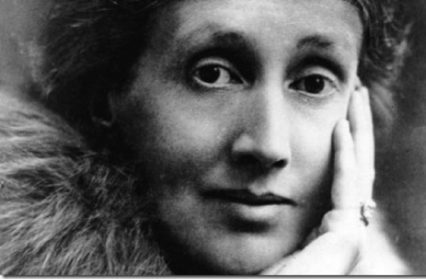Adam Somerset listens to BBC Radio 3’s The Essay to hear Francesca Rhydderch talking about Virginia Woolf’s Orlando.
The world of literature in May lost Roth and Wolfe within a matter of days. Posthumous reputation is ever unpredictable and within hours Big Media was hosting its instant judgement. Wolfe, declared a voice of given authority, was a journalist of the first rank but a novelist of the third. In riposte, four days after Wolfe’s passing, the Times published a letter from John Sutherland. Sutherland, Emeritus Lord Northcliffe Professor at UCL, placed Wolfe alongside Thackeray. “We shall see Wolfe for what he was, the last great (neo) Victorian novelist.”
History will come with time to its eventual verdict. Its judgement on the Bloomsbury set has settled: a great economist, essayist, publishing figure and art critic – Keynes, Strachey, Garnett and Fry – against painters – Bell and Grant – not of the first league. And a novelist, another Wolfe or Woolf, whose reputation a century on has never been higher.
One of the best of the new generation of critics, Alexandra Harris, wrote her own monograph on Woolf in 2011. And she was Francesca Rhydderch’s chosen subject for the Hay Festival of 2018. The fourth in a series of five titled “Wisdom from Fictional Females”, her subject was Virginia Woolf’s Orlando from 1928. Her talk, delivered to a live audience, was broadcast 31stMay in Radio 3’s The Essay strand and can be heard online.
Rhydderch’s talk is an elegantly structured 15 minutes. She homes in within moments on the book’s essence: “Orlando is no ordinary man and this is no ordinary novel. In the course of this exuberant, hilarious but serious book the reader sees Orlando travelling through time on a three hundred year whistle-stop tour of English literature.”
Rhydderch cuts to her own first encounter with the book. The time was her teenagehood. The location, a town of steel and tinplate, was one where masculinity was clear-cut. “The gender lines of my youth,” she says, “were like a pair of railway tracks, never touching, always running parallel with a certain distance between them.”
As a student she was told to read some English modernists and a friend loaned a copy of The Waves. “It was personal, revealing, intimate,” she says, “I was smitten.” A summer’s reading of everything Woolfean led to Orlando.
The novel was first conceived as an extended love letter to Vita Sackville-West. This, Rhydderch reminds her audience, was hazardous territory. The Well of Loneliness invited prosecution for obscenity in that same year, 1928. The qualities Rhydderch finds in Orlando are broad: “brave, witty… richly imagined… delivered with Woolf’s inimitable dry humour… great long beautifully punctuated sentences that were her trademark.”
The crux is the gender change. Orlando, at first little perturbed, realises she may no longer swear, draw a sword, lead an army or kill. Attendance to hair and clothes is the alternative. Orlando, says Rhydderch, is a tourist in a new country, the country of womanhood. As an ingenue she asks naïve questions which the reader also wonders. In Victorian times she is struck by the obsessions with chastity and wedlock. She succumbs to her own marriage which contains androgynous overtones. Woolf concludes that her character has so ordered her life that she need no longer fight her age nor submit to it. “She was of it yet remained herself.”
The book ends in the age of aircraft, its last date Tuesday 11th October 1928, the day of the book’s publication. Its theme is the multiplicity of possibilities within personality. “How can we hope to harness all the innumerable selves that we are?” Rhydderch ends with returning to the craft of the novelist: Woolf’s speed at creating complex characters in a handful of words, the interpolation of parody. Her last verdict is that it is “a genre-bending, gender-busting novel so far ahead of its time.” It is a “gift from Woolf’s future to our present, which can help us to be at least some of the many selves we may wish to be.”
As a tribute this talk marries warmth, economy, concision and critical acumen.
You can hear Francesca Rhydderch on Orlando on the BBC iPlayer.
Adam Somerset is an essayist and a regular contributor to Wales Arts Review.












